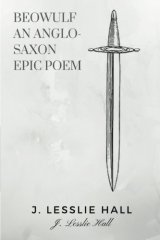Beowulf Page #7
Beowulf is an Old English epic poem consisting of 3,182 alliterative lines. It is one of the most important works of Old English literature. The date of composition is a matter of contention among scholars; the only certain dating pertains to the manuscript, which was produced between 975 and 1025.
{His challenge} "Who are ye men here, mail-covered warriors Clad in your corslets, come thus a-driving 50 A high riding ship o'er the shoals of the waters, [3]And hither 'neath helmets have hied o'er the ocean? [10] I have been strand-guard, standing as warden, Lest enemies ever anywise ravage Danish dominions with army of war-ships. 55 More boldly never have warriors ventured Hither to come; of kinsmen's approval, Word-leave of warriors, I ween that ye surely {He is struck by Beowulf's appearance.} Nothing have known. Never a greater one Of earls o'er the earth have I had a sight of 60 Than is one of your number, a hero in armor; No low-ranking fellow[4] adorned with his weapons, But launching them little, unless looks are deceiving, And striking appearance. Ere ye pass on your journey As treacherous spies to the land of the Scyldings 65 And farther fare, I fully must know now What race ye belong to. Ye far-away dwellers, Sea-faring sailors, my simple opinion Hear ye and hearken: haste is most fitting Plainly to tell me what place ye are come from." [1] 'From hám' (194) is much disputed. One rendering is: Beowulf, being away from home, heard of Hrothgar's troubles, etc. Another, that adopted by S. and endorsed in the H.-So. notes, is: B. heard from his neighborhood (neighbors), i.e. in his home, etc. A third is: B., being at home, heard this as occurring away from home. The H.-So. glossary and notes conflict. [2] 'Eoletes' (224) is marked with a (?) by H.-So.; our rendering simply follows his conjecture.--Other conjectures as to 'eolet' are: (1) voyage, (2) toil, labor, (3) hasty journey. [3] The lacuna of the MS at this point has been supplied by various conjectures. The reading adopted by H.-So. has been rendered in the above translation. W., like H.-So., makes 'ic' the beginning of a new sentence, but, for 'helmas bæron,' he reads 'hringed stefnan.' This has the advantage of giving a parallel to 'brontne ceol' instead of a kenning for 'go.'--B puts the (?) after 'holmas', and begins a new sentence at the middle of the line. Translate: What warriors are ye, clad in armor, who have thus come bringing the foaming vessel over the water way, hither over the seas? For some time on the wall I have been coast guard, etc. S. endorses most of what B. says, but leaves out 'on the wall' in the last sentence. If W.'s 'hringed stefnan' be accepted, change line 51 above to, A ring-stemmed vessel hither o'ersea. [4] 'Seld-guma' (249) is variously rendered: (1) housecarle; (2) home-stayer; (3) common man. Dr. H. Wood suggests a man-at-arms in another's house. V. THE GEATS REACH HEOROT. {Beowulf courteously replies.} The chief of the strangers rendered him answer, War-troopers' leader, and word-treasure opened: {We are Geats.} "We are sprung from the lineage of the people of Geatland, And Higelac's hearth-friends. To heroes unnumbered {My father Ecgtheow was well-known in his day.} 5 My father was known, a noble head-warrior Ecgtheow titled; many a winter He lived with the people, ere he passed on his journey, Old from his dwelling; each of the counsellors Widely mid world-folk well remembers him. {Our intentions towards King Hrothgar are of the kindest.} 10 We, kindly of spirit, the lord of thy people, The son of King Healfdene, have come here to visit, [11] Folk-troop's defender: be free in thy counsels! To the noble one bear we a weighty commission, The helm of the Danemen; we shall hide, I ween, {Is it true that a monster is slaying Danish heroes?} 15 Naught of our message. Thou know'st if it happen, As we soothly heard say, that some savage despoiler, Some hidden pursuer, on nights that are murky By deeds very direful 'mid the Danemen exhibits Hatred unheard of, horrid destruction 20 And the falling of dead. From feelings least selfish {I can help your king to free himself from this horrible creature.} I am able to render counsel to Hrothgar, How he, wise and worthy, may worst the destroyer, If the anguish of sorrow should ever be lessened,[1] Comfort come to him, and care-waves grow cooler, 25 Or ever hereafter he agony suffer And troublous distress, while towereth upward The handsomest of houses high on the summit." {The coast-guard reminds Beowulf that it is easier to say than to do.} Bestriding his stallion, the strand-watchman answered, The doughty retainer: "The difference surely 30 'Twixt words and works, the warlike shield-bearer Who judgeth wisely well shall determine. This band, I hear, beareth no malice {I am satisfied of your good intentions, and shall lead you to the palace.} To the prince of the Scyldings. Pass ye then onward With weapons and armor. I shall lead you in person; 35 To my war-trusty vassals command I shall issue To keep from all injury your excellent vessel, {Your boat shall be well cared for during your stay here.} Your fresh-tarred craft, 'gainst every opposer Close by the sea-shore, till the curved-neckèd bark shall Waft back again the well-beloved hero 40 O'er the way of the water to Weder dominions. {He again compliments Beowulf.} To warrior so great 'twill be granted sure In the storm of strife to stand secure." Onward they fared then (the vessel lay quiet, The broad-bosomed bark was bound by its cable, [12] 45 Firmly at anchor); the boar-signs glistened[2] Bright on the visors vivid with gilding, Blaze-hardened, brilliant; the boar acted warden. The heroes hastened, hurried the liegemen, {The land is perhaps rolling.} Descended together, till they saw the great palace, 50 The well-fashioned wassail-hall wondrous and gleaming: {Heorot flashes on their view.} 'Mid world-folk and kindreds that was widest reputed Of halls under heaven which the hero abode in; Its lustre enlightened lands without number. Then the battle-brave hero showed them the glittering 55 Court of the bold ones, that they easily thither Might fare on their journey; the aforementioned warrior Turning his courser, quoth as he left them: {The coast-guard, having discharged his duty, bids them God-speed.} "'Tis time I were faring; Father Almighty Grant you His grace, and give you to journey 60 Safe on your mission! To the sea I will get me 'Gainst hostile warriors as warden to stand." [1] 'Edwendan' (280) B. takes to be the subs. 'edwenden' (cf. 1775); and 'bisigu' he takes as gen. sing., limiting 'edwenden': If reparation for sorrows is ever to come. This is supported by t.B. [2] Combining the emendations of B. and t.B., we may read: The boar-images glistened ... brilliant, protected the life of the war-mooded man. They read 'ferh-wearde' (305) and 'gúðmódgum men' (306). VI. BEOWULF INTRODUCES HIMSELF AT THE PALACE. The highway glistened with many-hued pebble, A by-path led the liegemen together. [1]Firm and hand-locked the war-burnie glistened, The ring-sword radiant rang 'mid the armor 5 As the party was approaching the palace together
Translation
Translate and read this book in other languages:
Select another language:
- - Select -
- 简体中文 (Chinese - Simplified)
- 繁體中文 (Chinese - Traditional)
- Español (Spanish)
- Esperanto (Esperanto)
- 日本語 (Japanese)
- Português (Portuguese)
- Deutsch (German)
- العربية (Arabic)
- Français (French)
- Русский (Russian)
- ಕನ್ನಡ (Kannada)
- 한국어 (Korean)
- עברית (Hebrew)
- Gaeilge (Irish)
- Українська (Ukrainian)
- اردو (Urdu)
- Magyar (Hungarian)
- मानक हिन्दी (Hindi)
- Indonesia (Indonesian)
- Italiano (Italian)
- தமிழ் (Tamil)
- Türkçe (Turkish)
- తెలుగు (Telugu)
- ภาษาไทย (Thai)
- Tiếng Việt (Vietnamese)
- Čeština (Czech)
- Polski (Polish)
- Bahasa Indonesia (Indonesian)
- Românește (Romanian)
- Nederlands (Dutch)
- Ελληνικά (Greek)
- Latinum (Latin)
- Svenska (Swedish)
- Dansk (Danish)
- Suomi (Finnish)
- فارسی (Persian)
- ייִדיש (Yiddish)
- հայերեն (Armenian)
- Norsk (Norwegian)
- English (English)
Citation
Use the citation below to add this book to your bibliography:
Style:MLAChicagoAPA
"Beowulf Books." Literature.com. STANDS4 LLC, 2025. Web. 9 Mar. 2025. <https://www.literature.com/book/beowulf_945>.








Discuss this Beowulf book with the community:
Report Comment
We're doing our best to make sure our content is useful, accurate and safe.
If by any chance you spot an inappropriate comment while navigating through our website please use this form to let us know, and we'll take care of it shortly.
Attachment
You need to be logged in to favorite.
Log In